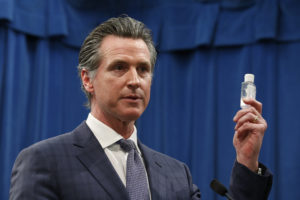Pentagon Wasting Millions Duplicating HHS Anti-Bioterror Program
The Los Angeles Times reports that the Pentagon is building a multimillion-dollar facility in northern Florida to, in effect, duplicate research already being done by the Department of Health and Human Services. That's one expensive turf battle.
In a classic display of Pentagon excess and waste, military leaders have quietly embarked on a new “production pipeline” to develop innovative anti-biowarfare materials including “vaccines and biodefense drugs,” the Los Angeles Times reports Saturday.
The problem is, the Department of Health and Human Services is already at work on the same thing in tandem with drug companies and academic researchers, which means the Pentagon is shifting millions of dollars earmarked for supplying “better masks, boots, early-warning sensors and other equipment” to U.S. troops, in favor of a new Florida facility that would duplicate a nonmilitary program.
And it’s not like Pentagon officials don’t know better. As the L.A. Times reports:
The overlapping efforts are precisely what some policymakers have warned against. The Defense Department program also flies in the face of an analysis, commissioned by the White House, that examined ways the government could bolster production of vaccines and biodefense drugs.
The 2009 analysis recommended against establishing a government-controlled facility, akin to what the Pentagon is doing, saying that contracting with private manufacturers would produce new drugs more quickly and at a lower cost.
The 112-page report has not been shared with Congress or previously publicized. A copy of the document was obtained by the Los Angeles Times.
The Pentagon initiative has been championed by Assistant Secretary of Defense Andrew C. Weber, a presidential appointee. The Times’ request for comment from Weber was referred to a top aide, James B. Petro.
In an interview, Petro said the Florida facility was needed to make medicines that the military could not rely on Health and Human Services or others to provide. The goal, he said, was to do “a more efficient and effective job” of acquiring the products.
“It’s about making sure that our men and women in uniform have the protection that they need against these threats,” said Petro, adding that Weber was aware of the 2009 analysis and that it had informed his staff’s “strategic thinking.”
How much strategic thinking is involved in deciding to duplicate, in a likely less-efficient way, a program that another agency is already working on? There are legitimate questions to be raised about the U.S. government turning to the private sector — read, profiteers — for essential parts of its military operations. But there are even stronger questions to be asked about why the military marches to its own drummer on these issues under a commander in chief who also oversees HHS.
The L.A. Times reports that the defense project is rooted in a January 2010 bipartisan analysis that flunked the Obama administration on preparing for a military rapid-response to biological attacks. Obama told the nation in his State of the Union address the day after the report came out that his administration was looking at new initiatives to better prepare, but “provided no details — which left it to rival bureaucracies, Health and Human Services and the Defense Department, to translate his words into action.” Without a top-down directive, the bureaucrats were left to slug it out over what seems to have become a turf battle. According to the Times:
Throughout much of 2010, senior officials from the two departments met at the White House to discuss how to secure speedier and more reliable manufacturing of vaccines and other medicines.
Health officials envisioned three manufacturing facilities, to be operated under contract by nongovernmental entities.
“We started off talking about doing this together,” said one of the Health and Human Services participants, who like other officials spoke on condition of anonymity because of the sensitivity of the matter.
But by late 2010 it was apparent to participants that Weber wanted the Defense Department to go its own way. According to senior officials who were involved, Weber was frustrated by the pace at which his Health and Human Services counterparts were moving, and did not want his department’s control of medical manufacturing to be subordinate to that of Health and Human Services’ Biomedical Advanced Research and Development Authority.
The Defense Department “wanted to be in charge of their own fate,” said another health official.
A Defense official gave a similar account: Health and Human Services “was going to build all three facilities. Weber said, ‘I want one of my own.'”
—Posted by Scott Martelle
.
Your support matters…Independent journalism is under threat and overshadowed by heavily funded mainstream media.
You can help level the playing field. Become a member.
Your tax-deductible contribution keeps us digging beneath the headlines to give you thought-provoking, investigative reporting and analysis that unearths what's really happening- without compromise.
Give today to support our courageous, independent journalists.




You need to be a supporter to comment.
There are currently no responses to this article.
Be the first to respond.